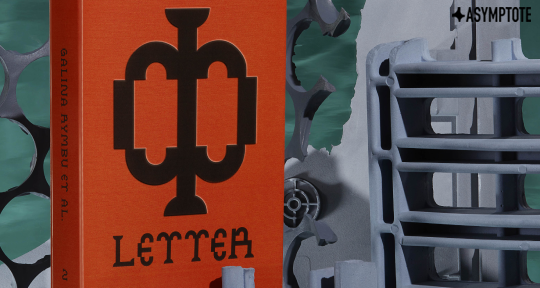The new poetry anthology F Letter: New Russian Feminist Poetry is the second work published in isolarii, as series of “island books,” released every two months by subscription. Edited by Galina Rymbu, Eugene Ostashevsky, and Ainsley Morse (with forewords by Eileen Myles and Amia Srinivasan), the groundbreaking collection features the work of twelve feminist Russian women and members of F pis’mo. As well as co-editing this anthology, Galina Rymbu is a famed Russian poet, whose own work was published by Asymptote in 2016 and whose poems are included in F Letter. Rymbu formed the F pis’mo poetry collective with other feminist and LGBTQ poets in 2017 in order to use language as a form of political protest. F pis’mo‘s work has since inspired a new generation of Russian poets to challenge patriarchal society by giving voice to their own personal experience through poetry. In this essay, Asymptote‘s editor-at-large for Central America, José García Escobar, speaks with Galina Rymbu as well as other F Letter poets, translators, and editors to discuss the collective’s work.
Saint Petersburg. January 2, 2017. Poetess Galina Rymbu was in her house, waiting for a knock on her door. Hopefully several. Galina had sent out an invitation to everyone interested in talking about feminism in literature.
“We thought that only a few people would come,” she writes, from her house in Lviv, Ukraine, where she has lived since 2018.
In the end, more than forty people crammed inside Galina’s tiny kitchen.
“Some were standing, some were sitting on the floor.”
Not only poets and writers went. Activists, artists, and theatergoers were there as well. Galina says that there were no feminist literary communities in Russia at the time. It is a country where the work of heterosexual, cisgender male authors sits, untouched, at the forefront, and where women and LGBTQ authors are often ignored. Galina describes Russia’s literary community as conservative and patriarchal.
“During that first meeting, we said that we didn’t want to be locked in our small circle of ‘feminist literature,’” she says. “We wanted to change literature to make it more gender-sensitive.”
In Russia, according to Galina, only artists working for the state receive financial support. They work under a set of rules, naturally. Don’t write about the LGBTQ community, don’t write about the occupation of Crimea and Donbas, cooperate with Putin’s regime, for example. Poets, writers, musicians, and film and theatre directors who abide by these rules have access to public platforms, large publishing houses, and galleries. These spaces must also follow the rules. Galina says that censorship is everywhere—in the media, television, literary, and film festivals—and compares it to Kafka’s Der Process. Those outside the cultural circuit of Russia’s state, like Galina, resort to independent publishing, where there’s no censorship, but also no visibility—much like Russian writers did before 1991 and the dissolution of the Soviet Union. The existence of these artists is a political act. Their work is often, and by definition, dissident.
“It was impossible for us to remain feminist poets and express our views only in the space of political activism,” Galina says. “We wanted gender politics to enter literature as if it was its native part, as an irreplaceable part of reality.”
And thus, F pis’mo was born. READ MORE…

